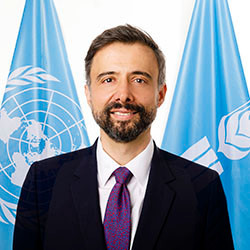Summit for a New Global Financial Pact
IFAD Asset Request Portlet
Asset Publisher
Summit for a New Global Financial Pact
Statement by Alvaro Lario, President of IFAD
By Alvaro Lario
Location: Paris, France
22 June 2023Check against delivery
Boosting the Role of the Private Sector to Address Development and Climate Challenges via Food Systems Transformation - IFAD-led side event
Ladies and gentleman, distinguished guests. Today, we stand at a critical juncture in our global efforts to address the interconnected challenges of development and climate change. The urgency to achieve the Sustainable Development Goals and combat the adverse effects of climate change and conflicts necessitates bold and innovative solutions.
We have all heard of the “billion to trillions” agenda, whereby private capital is supposed to flood-in to resolve all of our global development challenges. We also all know that this has not happened at the pace and extent needed to transform our world sustainably and inclusively, for all.
Agriculture is underfunded by the private sector. This is despite the sector’s critical relevance for food security and climate resilience. For example, agriculture accounts for 70 per cent of all freshwater withdrawals globally. Eliminating food loss and waste alone could reduce by a quarter the water used by agriculture, and at the same time save millions of dollars and cut global GHG emissions by 8 per cent.
The private sector has immense potential to drive sustainable development. Its entrepreneurial spirit, technological expertise, and access to capital can catalyze the transformative changes we seek in our food systems.
International Financing Institutions (IFIs) are actively working to harness the power of the private sector in tackling the challenges head-on.
Current food and agriculture policies and business as usual industry strategies will not ensure food security and nutrition for a growing population. New approaches are needed.
Farmers cannot be expected to change practices, incur additional costs, and assume new risks entirely on their own. Agribusiness strategies across the food supply chain must increasingly provide incentives for adopting sustainability practices on-farm.
This is where IFIs such as IFAD can come in.
The unique nature of agriculture and the challenges faced by small-scale producers require tailored interventions.
Specialized IFIs such as IFAD understand this and are actively developing innovative finance solutions that respond to the specific needs of the agricultural sector. These instruments aim to de-risk investments, reduce transaction costs, and provide access to financial services for small-scale producers and address the specific needs of underserved groups like women and youth. Blended finance is a powerful tool that combines public and private resources to mobilize private capital at scale.
By combining financial and non-financial support, and leveraging digital technologies, such as mobile banking and blockchain, IFIs are promoting financial inclusion and empowering farmers to adopt climate-friendly practices, enhance productivity, and access markets.
To accelerate progress toward sustainable development also requires collaboration and knowledge-sharing. IFIs serve as vital hubs for exchanging best practices, experiences, and lessons learned globally. By facilitating knowledge sharing and capacity-building initiatives, IFIs enhance the private sector's ability to implement sustainable practices, adopt climate-friendly technologies, and navigate the challenges of food systems transformation.
As we embark on this transformative journey, let us seize the opportunities presented by the innovative and blended finance approaches championed by IFIs. Let’s also not forget about traditional methods that proved to be effective.
"Boosting the Role of the Private Sector to Address Development and Climate Challenges via Food Systems Transformation" should be more than a topic, it is also a call to action. I am extremely honoured that our guest speakers have joined us today to discuss various approaches and forge strategic partnerships to unlock the immense potential of the private sector.
By doing so, we can create a sustainable future where development and climate challenges are addressed, and our food systems thrive for generations to come. Together, we can contribute to forging a new Global Financial Pact that prioritizes the needs of the world’s poorest and most vulnerable countries.
Thank you.
